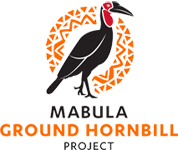Welcome to the Mabula Ground Hornbill Project
We would like to ensure that this site contains all you need to know about Southern Ground-hornbills (Bucorvus leadbeateri) and their conservation.
This charismatic species is both culturally and ecologically important. They are hailed across their sub-Saharan range as the thunder birds or rain birds. They are also a valuable flagship species for the savannah biome as they are easily recognisable and with such large spatial requirements, any successful conservation action in even one of their expansive territories benefits all the other savanna and grassland species, including threatened species such as vultures, wild dog and cheetah.
At present, Southern Ground-hornbills are considered internationally as "Vulnerable" throughout their sub-equatorial range in Africa by the IUCN, but within South Africa and Namibia they have already been classified as "Endangered"Taylor et al. 2016, with their numbers outside of formally protected areas still declining. Their populations continue to decline towards being "Critically Endangered" in South Africa.
The reasons for their decline are predominantly loss of habitat to bush-encroachment and development, overgrazing, large-scale monoculture, loss of large nesting trees, besides secondary poisoning, lead toxicosis from spent lead ammunition and electrocution on transformer boxes.
We are working to slow the decline by:
- Harvesting and rearing of redundant second-hatched chicks that would naturally die of starvation and dehydration if left in their wild nests. These artificially reared chicks double the productivity and form a sustainable source of birds for the reintroduction and conservation captive breeding programmes.
- Re-wilding these artificially-reared chicks using wild-experienced adults as mentors in carefully managed groups called "bush schools".
- Reintroduction of the "rescued" birds back into areas where they have become locally extinct once original threats in those areas have been mitigated.
- Provision of artificial "super nests" to wild groups with no or inadequate nests.
- Research on genetics, behaviour and other important unanswered questions necessary for successful conservation management of the species.
- Coordination of a nationwide awareness campaign to educate the general public to the threats facing the thunder birds and to reinstate the bird into the collective memory in areas where it has become locally extinct.
- Custodianship programme that aids land-owners and managers and community leaders to manage in a way that will ensure sustainability of their locally resident ground-hornbill families.
We have come a long way since 1999, when the first group of ground-hornbills was released at the Mabula Private Game Reserve in Limpopo, marking the establishment of the project. Partnerships have been formed, chicks have been rescued and reared, birds have been rehabilitated or re-wilded and released, awareness has been raised and people across South Africa and the world have rallied together, all in an effort to turn things around for ground-hornbills.
We hope you too will join and support us to ensure that our thunder or rain bird continues to roam the African savannas and grasslands.



